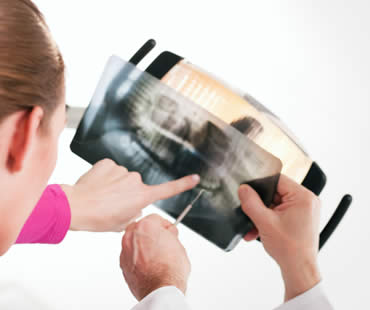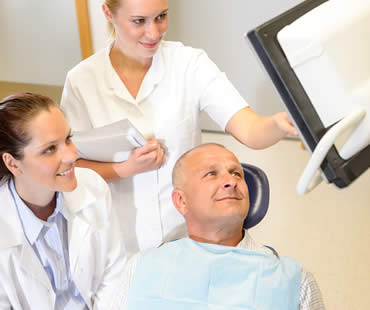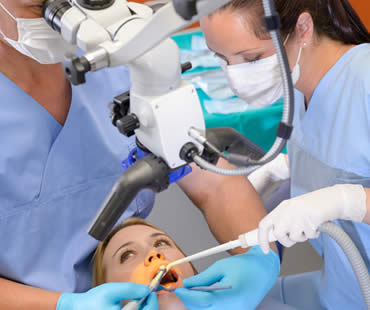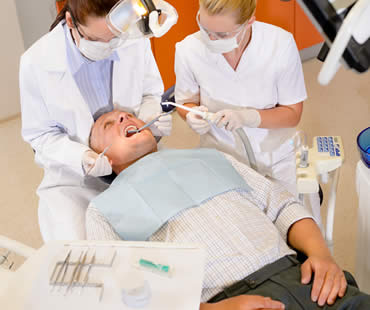
If your teen is scheduled to have wisdom teeth extraction surgery, you might be feeling stressed-out about the procedure and how you can best prepare for what’s to come. Surgery can be frightening. As the adult, it’s your role to get the information you need and to educate and calm your teen so that you both have a feeling of confidence and safety during all steps of the oral surgery.
Don’t mislead your teen about the procedure or recovery time. Talk about the reasons the wisdom teeth need to be extracted; be honest about the issues. Talk about the oral surgeon and his or her qualifications and why this particular surgeon was chosen. Help give your teen a sense of trust in the surgeon, to help calm his or her nerves.
Listen to everything your child has to say regarding the surgery. Validate all your child’s feelings and statements and offer any guidance you can from your own life’s experiences. Be open to allowing a conversation between the surgeon and your teen. Your oral surgeon has experience in dealing with fearful patients and can often remedy fearful thoughts and feelings more efficiently than a parent.
Reassure your child that you won’t be far away during or after the procedure. Even though your teen may be already in college, surgical procedures can be frightening and you might be surprised at how much your teen may lean on you, emotionally and physically during this time.
Answer any of your child’s questions honestly. Go over any parts of the surgery that are confusing to your teen. This knowledge can restore a sense of control to the patient, and allow the patient to feel prepared to recover.
Your teen’s oral maxillofacial surgeon wants your teen to be comfortable during the surgery. Sedation dentistry options may be offered as early as the night before, so that the patient can be well-rested and calm for the procedure.
Schedule your appointment at our Sicklerville dental office

Wisdom teeth are the third set of molars, and usually emerge in the late teens or early twenties. Standard dental practice is to remove wisdom teeth prior to them being fully formed when the roots have not yet had a chance to develop and fully root into the jaw. Younger patients usually have an easier recovery from surgery and many dentists believe early removal prevents future dental problems associated with wisdom teeth.
If your wisdom teeth were not removed as they emerged, there are some signs and symptoms that would indicate the need for extraction including:
- Wisdom teeth that are impacted, which means they have become trapped in the jawbone or gums.
- Wisdom teeth that are emerging at an awkward angle, causing pressure on adjacent teeth.
- Wisdom teeth that do not fit in your mouth, causing crowding of the surrounding teeth as well.
- Wisdom teeth that are suffering from decay or disease caused by the inability to keep them cleaned properly.
- Wisdom teeth that have developed fluid-filled cysts near the gumline.
- Wisdom teeth that are causing pain due to any of the above reasons.
The decision about whether or not to remove your wisdom teeth should be made in consultation with your dental professional. Your dentist or oral surgeon can assess the position and health of your wisdom teeth and make a recommendation for treatment.
If extraction is recommended, they may choose to extract one tooth or all four molars at once. Recovery from the outpatient procedure takes just a few days, and you will quickly be back to normal. Consult with your dental professional if you are experiencing any of these symptoms listed to determine if you should consider wisdom tooth removal to ensure your future good oral health.
Our dental office is located in Sicklerville

Chewing and swallowing can be tricky after wisdom tooth extraction. Gauze pads and a sore mouth can make eating sound unappealing, but it is vital to your healing to maintain a healthy diet. When you have a tooth extracted, a clot forms to help with healing. It’s important not to disrupt the clot, which means it is crucial to maintain a soft-food diet. In addition, spicy, acidic or hard-to-chew foods can cause additional discomfort and prevent healing.
For the first one or two weeks after your wisdom tooth extraction, plan to stick to a diet of soft, easy-to-chew foods. This guideline does not mean you are stuck eating Jello for your entire recovery period. Some suggestions for healthy foods that would be appropriate after wisdom tooth extraction include:
- Mashed potatoes
- Milkshakes
- Cottage cheese
- Macaroni and cheese
Be careful never to use a straw during recovery, as the suction can remove the clots in your gums and create problems with healing. Some of these foods may still be too chewy, so you will need to gauge if they need to be cooked longer or further softened to make them easier to ingest. Pasta or macaroni can be overcooked to make it easier to chew, and soups can be blended to eliminate chunks of vegetables or meat. Be sure to follow the aftercare and eating recommendations of your oral surgeon, and don’t push yourself to return to normal foods until your mouth feels ready.
If you live in the Sicklerville area contact us today

Many people are afraid of getting their wisdom teeth out based on horror stories from the internet or scary tales exaggerated by others. The best way to fight these fears is to learn more about the procedure and what you can truly expect.
The first thing to know is that wisdom teeth extractions are the most common oral surgeries. Most oral surgeons perform an average of one a day, so that experience has provided skill and expertise in the procedure. Also, you will be under some degree of anesthesia. Whether it’s general anesthesia or even just nitrous oxide (laughing gas), you won’t feel anything during the surgery and won’t remember what happened afterwards.
One common fear is the bleeding associated with wisdom teeth extractions. While there is some bleeding from the site after surgery, it is usually easily controlled by following the after-care instructions. You will be told to gently bite on gauze in that area of your mouth, and change it frequently. Propping your head up will help limit the bleeding also.
Swelling is another reason some fear this surgery, but it should be gone in just a few days. You can hold ice packs to the outside of your cheek off and on for the first 24 hours to decrease the swelling.
The recovery process should go smoothly if you follow your oral surgeon’s advice. Have someone drive you to and from the appointment, and eat soft foods at first. Do not use a straw for the first few days, and avoid touching the area with your fingers or tongue. Also, do not smoke for at least the first 24 hours following surgery.
While there are risks associated with any surgery, most wisdom teeth extractions are without complications and recovery is complete in just a few days to a week. The benefits of having the surgery outweigh the risk of ignoring your dentist’s advice to have your wisdom teeth removed.
Schedule your appointment at our Sicklerville dental office

Your third molars, or wisdom teeth, are usually the last to make their appearance in your mouth. Some people don’t even have them break through at all. Whether or not they erupt, they can wreak havoc in your mouth if there isn’t enough room for them. If they become impacted, removal becomes even more important.
Your dentist will monitor your wisdom teeth through examinations and X-rays, and will recommend extraction if it appears they may cause any complications. Some dentists suggest removing them even if they aren’t impacted, as they can be difficult to clean and therefore prone to decay. Wisdom teeth may even get infected, requiring immediate medical attention. Symptoms of infected wisdom teeth can include:
- Pain in the tooth and gums
- Gum bleeding
- Gum inflammation
- Swelling in the face and jaw
- Headaches
- Bad breath
If your dentist says you need to have your wisdom teeth extracted, don’t put it off because it is better to have them removed before further complications occur. Usually, you will be referred to an oral surgeon for extraction. If only one tooth is involved, local anesthesia may be sufficient. The removal of multiple wisdom teeth typically requires general anesthesia, and is a day surgery so that you can return home afterwards.
It is important for you to follow your doctor’s instructions after tooth extraction to avoid problems. Your activities might be restricted for the first day or two, ice or heat can be helpful, and care should be taken if stitches are present. You will also be given a list of foods that are suggested during your recovery. If you follow all of your doctor’s advice, you can be expect to return to your normal activities soon and no longer have to worry about any problems those teeth might cause.
Our dental office is located in Sicklerville

Evolution has rendered wisdom teeth useless, and a high percentage of these unnecessary molars eventually require removal. When a wisdom tooth, otherwise known as a third molar, cannot erupt into proper alignment, it is called impacted. Oral surgery to extract impacted wisdom teeth may be considered if you have the following problems:
- Mouth pain and bite problems caused by damage to surrounding teeth created from crowding caused by the extra molars.
- Jaw and nerve damage caused by cysts that form around the impacted wisdom teeth.
- Sinus pain, pressure and congestion resulting from problems with wisdom teeth.
- Inflamed and infected gum tissue created because the area around impacted wisdom teeth is difficult to clean properly.
- Cavities which develop due to infected gums that allow pockets to form between gums, allowing bacteria to grow.
- Alignment issues that alter the effects of braces, bridges, crowns and partial dentures due the crowding created by impacted wisdom teeth.
To diagnose impacted wisdom teeth, your dental professional will look for signs of infection or swollen gums. Your dentist will also inquire about your regular oral hygiene habits. The diagnosis of impacted wisdom teeth can be confirmed with dental x-rays, which may also reveal damage to the other teeth or jawbone.
When making a decision with your dentist about wisdom tooth extraction, it’s important to consider your age. Typically third molars erupt between the ages of 16 and 25 years. Younger patients experience considerably fewer complications with oral surgery for wisdom tooth extraction than older adults.
If your dental professional recommends removal due to the diagnosis of an impacted wisdom tooth, ask for a referral to a qualified oral and maxillofacial surgeon to ensure a successful and complication-free oral surgery.
We treat patients from Sicklerville and the surrounding area












